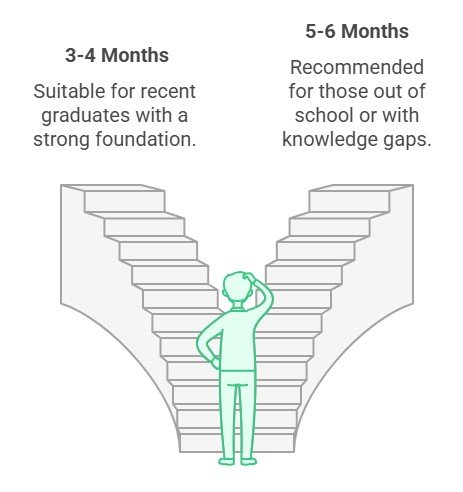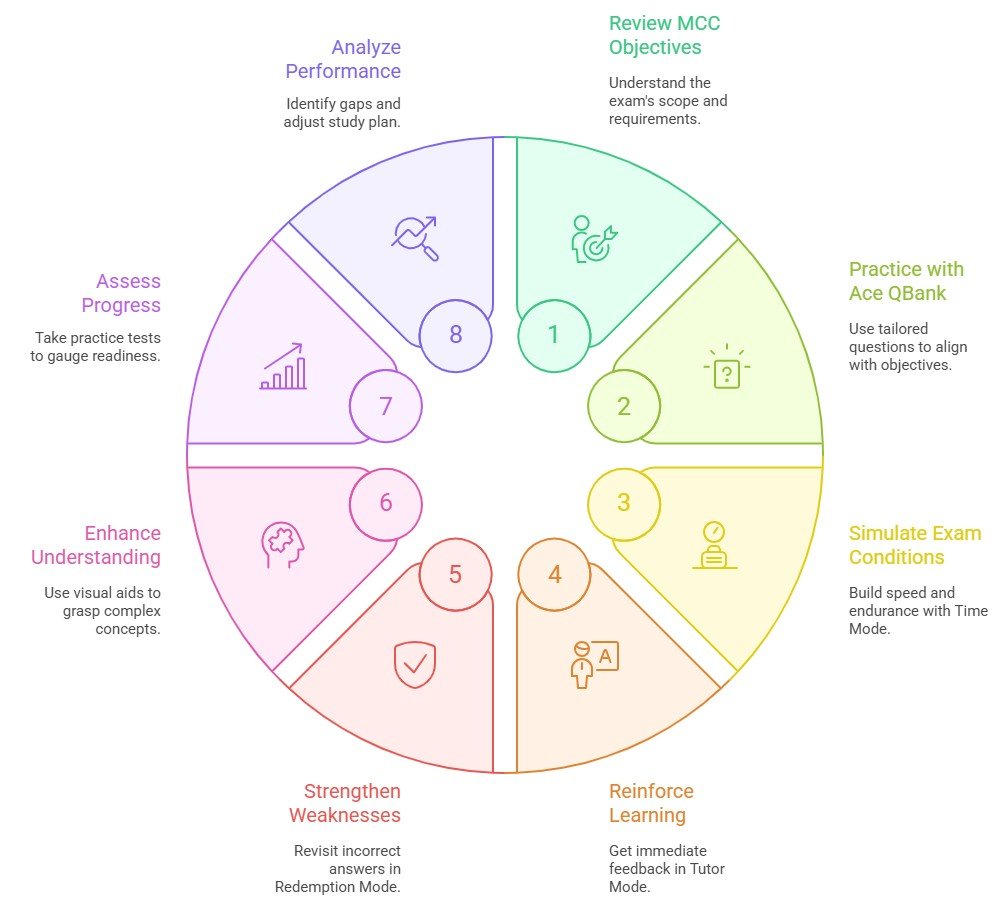Countdown to Aug-Sep 2025 MCCQE1 Exam Dates for Success

The deadline for the August-September 2025 MCCQE1 exam is fast approaching. If you have signed up for the exam. Now is the time to craft a disciplined study plan. This moment demands focus and resolve to transform preparation into success.
A mistake candidates often encounter is not having a clear study plan laid out. Without that roadmap. It is easy to lose focus and momentum. Setting a structured plan keeps you on track, stress at bay and boosts your retention. Equally important is having access to a question bank to practise questions.
In this post, I am diving into how you can smartly plan your study time to dodge those all-too-common pitfalls that many face. I will walk you through mastering the MCC objectives using the Ace QBank. Then, we will break down the top three strategies that have been proven to supercharge your exam prep, helping you approach test day confident and ready to crush it.
Ready for August-September 2025 MCCQE1
The clock is ticking with the August-September 2025 MCCQE1 looming. Now is the moment to shift gears and commit to a preparation strategy. A strategy that turns your hard work into a high MCCQE1 score.
By now, you know that this exam is your gateway to practicing medicine in Canada. It assesses your clinical decision-making and medical knowledge. All across a meticulously designed 200+ multiple-choice question set.
What stands out here is this. Each year, more than 4000 candidates step into the arena for the MCCQE Part 1 examination. It is a formidable challenge, yet more than 86% manage to succeed.
However, I should add that these statistics are of candidates who took the exam for the first time and managed to succeed. The table below paints a more vivid and compelling picture for you. Illuminating the details with clarity.
MCCQE Part 1 Pass Rates (2021-2025) | |
Medical Graduate Category | First-Time Pass Rate Range (%)* |
2021-2022 | |
Canadian/US Medical Graduates (CMGs) | 96 |
International Medical Graduates (IMGs) | 64 |
2022-2023 | |
Canadian/US Medical Graduates (CMGs) | 94 |
International Medical Graduates (IMGs) | 57 |
2024-2025 | |
Canadian/US Medical Graduates (CMGs) | 94 |
International Medical Graduates (IMGs) | 53 |
* Pass rate ranges are based on reported data and may slightly vary depending on the source and year. | |
But here is the thing, those who succeed often share one trait. And that is focused MCCQE1 Exam Preparation. So, start by mapping out your preparation weeks. Break down the MCC objectives into daily goals and prioritize high-yield topics.
Perhaps you have heard that tackling the MCCQE1 can seem like an uphill battle. That’s because there is just so much ground to cover. But the good news is that the Canadian question bank, much like Ace QBank.
Makes this mountain much more manageable. The Qbank offers high-yield questions built based on the Medical Council of Canada’s objectives. So you know you are focusing on what counts.
What’s brilliant is how it breaks medicine down into 21 clear categories. This bird ‘s-eye view means you don’t have to find a needle in a haystack. Instead, you target these core sections.
Some, like emergency medicine and paediatrics, might be tougher. Then start there and get ahead of the game.
As someone who’s been through this grind. I can’t stress enough the power of active learning. Use the question bank to mimic the pressure of exam day. And really dig into the explanations. They’re rooted in evidence-based medicine, which makes all the difference. I will unpack that more soon.
One thing you should know is that consistency is the quiet force that will carry you through this exam prep. Track your progress diligently as each step forward counts. And when that stubborn voice of doubt tries to sneak in. You stand firm, trust in your effort and keep pushing ahead.
However, if you’re subscribed to the Qbank, trust me. You have got everything you need right at your fingertips. Just keep pushing forward.
Getting to Know the New MCCQE1 Exam
The MCCQE Part 1 is a vital exam for medical students and graduates in Canada. From 2025, change to a summative examination composed of 230 multiple-choice questions.
The exam focuses on assessing critical medical knowledge and clinical decision-making skills at a level expected from medical students. Those who are completing their medical degrees in Canada.
The exam is designed to ensure candidates have the necessary knowledge to progress into supervised medical practice. It serves as a national standard for medical schools across Canada. With most candidates taking it at the end of their medical school training.
The international medical graduates (IMGS) who wish to enter a Canadian residency program also take the exam.
However, those IMGs with a decade of clinical experience. Take the MCCQE1 as part of their criteria for practice-ready Assessment programs (PRA).
Note
For your information only. The PRA programs help IMGs integrate into the Canadian healthcare system more smoothly. These programs often include clinical assessments, such as direct observation of patient care and simulation exercises. The MCCQE Part I exam is sometimes used as an eligibility criterion to participate in these PRA programs.
Passing the MCCQE1 is essential. Because it is one of the requirements to obtain the Licentiate of the Medical Council of Canada (LMCC). The LMCC is required by authorities to obtain a medical licence here in Canada.
Successfully completing the exam helps open the pathway. To either supervised practice or residency training.
Where can I find the 2025 MCCQE1 Exam Dates?

When you are gearing up for the 2025 MCCQE Part 1 exam. Your first stop should be the official Medical Council of Canada website. There, under the “MCCQE Part 1” section. You will find the exam schedule and all the registration details you need.
However, the actual booking of your exam date happens somewhere else. To see all available dates and lock in the one that suits your schedule. You need to log in to your account on physiciansapply.ca.
This is where the full range of options opens up. You get to choose the exam date that fits your life best.
What I appreciate most about this platform is its flexibility. In life, things change and emergencies arise. In such cases, physiciansapply.ca allows you to reschedule or adjust your exam date without any hassle. That kind of control is priceless when you are juggling so much already.
So yes, start at the MCC website for the big picture. But remember, it’s through physiciansapply.ca that you take control of your exam.
Plan Your MCCQE1 Exam Prep Duration for Guaranteed Success

In this section, I would like to talk about crafting a rock-solid plan for your MCCQE1 exam preparation. That’s because the right prep duration can make all the difference between stress and success. And with the right approach, you have got this.
Therefore, as someone who’s been through the grind. I am here to break down how to strategically plan your study timeline for guaranteed results.
First, let’s get real about what the MCCQE Part 1 entails. The exam assesses your medical knowledge and problem solving skills across a broad range of topics.
It is a computer-based exam with multiple-choice questions and a set time limit designed to assess your readiness for residency.
According to the Medical Council of Canada. The exam covers everything from internal medicine to pediatrics, surgery and public health.
With such an expansive and demanding scope laid out for this exam. The sheer volume of material to be mastered. It simply cannot be underestimated. This is not a matter of reviewing a few notes or skimming through chapters at the last minute.
The depth and breadth of knowledge required call for a discipline. Sustained approach to preparation.
Success demands steady and thoughtful engagement over time. Allowing understanding to take root and confidence to build.
You need a well-structured timeline to turn your weaknesses into strengths. But the question is, how long should you prepare?
Experts generally recommend 3 to 6 months of dedicated study time for the MCCQE part 1 exam depending on your starting point.
If you are a recent medical graduate with a strong foundation. 3 to 4 months of focused prep might suffice. However, if you have been out of school for a while or have significant gaps in knowledge. Aim for 5-6 months to build confidence.

Let’s break this down into actionable steps based on resources like Ace QBank and textbooks such as Toronto Notes. For a 4-month exam preparation plan.
Kick off with a diagnostic test using the Qbank’s self-assessment. This is to identify your baseline strengths and weaknesses. Spend the first month focusing on high-yield topics which frequently appear on the exam.
And if you have a problem understanding a medical concept. Use Toronto Notes as your go-to comprehensive explanation. It is the only Canadian resource that is well aligned with the question bank.
Dedicate the next 6-8 weeks to targeting weaker areas with the Qbank study mode. Select the category and create question blocks. Reinforcing concepts with deeper dives into Toronto Notes chapters.
In the final month, shift to full-length practice questions in timed mode on Ace QBank. This mimics test day conditions. And help you hone your time management and endurance. While reviewing explanations to solidify learning.
If you are on a 6-month timeline to prepare. Use the extra time to pace yourself and integrate clinical exposure if possible.
Months 1-2 should focus on building a strong conceptual base across all disciplines using Toronto Notes for structured reading.
Months 3-4 are ideal for intensive question practice with the Qbank. Create question blocks from specific categories to tackle and address knowledge gaps. The last two months should center on self-assessments. And fine-tuning through simulated tests.
Those familiar with this platform. Know that the self-assessment isn’t the only way to measure your progress.
You can select a category you’re comfortable with and dive into Time Study mode. This mode mimics exam day down to the ticking clock. Putting real pressure on your time management. It’s where you sharpen those skills that matter most when the stakes are highest.
But here’s what really sets this platform apart. There’s a unique feature that lets you build question blocks from all the ones you answered incorrectly.
What I call Redemption mode. Why Redemption? Because it offers a second chance. A shot at those tough questions that tripped you up before. Giving you the opportunity to redeem yourself.
With all these features and evidence-based medicine explanations. Scoring below 60% on self-assessments? Well, let’s just say that shouldn’t be an option anymore.
Lastly, don’t underestimate the power of flexibility in your plan, life happens. Whether it’s a family commitment or unexpected fatigue. Build buffer weeks into your schedule for catch-up or rest.
How to Master the MCC Objectives with Ace QBank for the MCCQE1 Exam Prep?

Most candidates are knee-deep in MCCQE1 exam prep right now. Chances are, if you are gearing up for the exam. The MCC objectives have already crossed your radar.
These objectives are your essential roadmap. A roadmap to mastering the knowledge that will get you one step closer to licensure here in Canada.
But let’s be honest, tackling these objectives is not a walk in the park. That’s where a solid question bank like Ace QBank steps in and changes the game. With its powerful features tailored to align perfectly with MCC objectives. It gives you an edge.
The edge to transform what could be an uphill battle into a clear path forward. In short, the Qbank isn’t just about practising questions. It is about turning your hard work into success on exam day.
You see the MCC objectives outline core competencies across all disciplines. From internal medicine, surgery to public health. The exam emphasizes proper clinical decision making. Along with problem-solving and critical thinking. All within patient-centred care.
Therefore, to tackle the exam effectively. You need a resource that mirrors the exam’s depth and breadth. While offering high-yield practice questions. That’s where Ace QBank shines with its 2,800 high-yield questions specifically designed for MCCQE1.
These questions are designed based on the MCC objectives. That means by working through this extensive question bank. You are directly engaging with the content that the MCC expects you to master.
What sets the Qbank apart are its four unique features tailored to streamline your preparation. The Time Mode lets you simulate real exam conditions. Helping you build speed and endurance to handle the exam time constraints.
Meanwhile, Tutor Mode provides immediate feedback as you answer, reinforcing learning on the spot. Perfect for covering difficult categories with ease.
Then there’s Redemption Mode, which focuses on revisiting incorrect answers to turn weaknesses into strengths. Ensuring you don’t miss critical concepts.
Lastly, the Retention and Enhancement Features include flow charts, summary tables and custom illustrations in the explanation sections. Breaking down intricate medical concepts into digestible visuals. These tools make complex medical concepts much simpler to grasp and retain.

Beyond practice questions, the platform offers two self-assessments that are game-changers for tracking your progress against the MCC objectives.
These full-length practice tests mimic the actual exam format. Helping you gauge your readiness across all tested domains. The best part is that their questions are distinct from the main question bank. Meaning you are not encountering the same questions.
After each assessment, you get detailed performance analytics to pinpoint gaps. So you can adjust your study plan accordingly. The exam isn’t just about knowing the material. It is about applying it under pressure and self-assessments prepare you for exactly that.
To maximize your MCCQE1 score, integrate the Qbank into a structured study plan. Start by reviewing the MCC objectives on the Medical Council of Canada’s website to understand the scope.
Then use the Qbank’s categorized questions to target a specific category. Dedicate time each week to practice in Time Mode to build exam-day stamina. And use Tutor Mode for in-depth learning of challenging topics.
Regularly revisit missed questions in Redemption Mode. This is to ensure no MCC objective slips through the cracks. And don’t skip those visual aids. Those flow charts and illustrations can transform a confusing concept into a clear mental picture. Helping you to recall the key points on the exam day.
Where can I take Self-assessments for the 2025 MCCQE1?

One of the best ways to assess your readiness is through self-assessments that mimic the actual exam experience. The Qbank offers an excellent platform to take these self-assessments that are designed specifically for the MCCQE part 1 exam.
You can access the self-assessments directly on the official website. Once you sign up. You have the flexibility to activate each self-assessment anytime, with full access for two weeks.
This allows you to practice at your own pace and schedule. I should mention that the self-assessments come with instant results and detailed reports to identify areas needing improvement.
However, if you purchase the Premium package. You gain access to both self-assessments included in the package. You can activate them whenever you feel ready. Allowing you to tailor your preparation according to your progress.
This flexibility, combined with comprehensive test simulations. Ensures you get the most accurate evaluation and confidence boost before exam day.
When should I take Ace QBank Self-assessments?
I can’t stress enough how essential self-assessments are for your success. They are the key to understanding your progress. Let me show you exactly when to take these game-changing tests.
So you can boost your performance and stay ahead of the curve. Timing is everything and getting it right will make all the difference.
Start with the first self-assessment early in your study timeline. Ideally, after 4-6 weeks of preparation or once you have covered the high-yield MCC objectives. This initial test acts as a diagnostic tool to reveal your strengths and knowledge gaps.
The detailed analytics will pinpoint weak areas. This allows you to tailor your study plan effectively. Say, you found out that pediatrics needs more focus.
Schedule the second self-assessment 2-3 weeks before your exam date. After you have tackled most content and practiced extensively with 2,800 questions.
This test gauges your readiness under timed conditions, mimicking the actual exam pressure. Use the results to fine-tune your final review. Focusing on lingering weaknesses. While building confidence in your progress.
Timing is everything when it comes to self-assessments. It is not about rushing headlong into them nor about dragging your feet. The key lies in striking the perfect time. Take the time you need but equally don’t fall into the trap of procrastination. Your insights depend on getting this timing just right.
How Can I Sign Up for Ace QBank Demo Questions?

To gain access to the free demo questions. You will first need to register for a free demo account. This opportunity is much more than just unlocking a set of free questions.
It is an invitation to immerse yourself in the full Qbank experience. By signing up you get to explore the entire user interface of the question bank.
This hands-on exploration. Allows you to familiarize yourself with every aspect of the platform. Giving you a chance to see how it can support your preparation in a meaningful way.
Once inside, you will be able to try out important features. Features such as flagging questions that you want to revisit later. And also highlighting key information within questions and explanations.
These tools are thoughtfully integrated to help you focus your study sessions. Making your learning more effective.
Additionally, the demo lets you create personalized question blocks. And select from different study modes including timed practice or tutor mode. These study modes allow you to customize your study sessions based on your preferences.
So, sign up for the free demo. Dive into the questions, test the functionality and see for yourself how the Qbank can transform your study experience.
Top 3 Proven Strategies for the MCCQE1 Exam Prep in 2025

Preparing for the medical licensing exam can feel overwhelming. Especially with the new format of the exam in 2025. But the truth is, success in this exam doesn’t come from cramming all night or endless passive reading.
It comes from using proven strategies that help you retain information. More importantly apply clinical knowledge confidently and reduce stress along the way.
I remember being in your shoes. Feeling that mix of excitement and anxiety. Staring at a mountain of study materials and wondering where to even begin.
That’s why I want to share with you something more than just study tips. I want to offer the top three strategies that have helped many ace this exam. Strategies that are grounded in real experience and backed by science.
The journey to 2025 MCCQE1 success is a marathon not a sprint. And with the right strategies. You can make every step count. Let’s walk through this together and turn that pressure into your greatest asset. Here is the list of the top three proven strategies:
- Master the MCC Objectives
- Leverage Practice Questions
- Get adequate sleep
- Master the MCC Objectives with Targeted Study Plans
The MCC has laid out a clear roadmap through their objectives list. These objectives are the heart and soul of the MCCQE1.
In other words, the list covers everything from clinical decision-making to patient management, ethics and public health. Essentially, the medical knowledge you will need as a physician.
In order to tackle this beast effectively. You should start aligning your study with the MCC objectives. Prioritize high-yield topics and build a study plan that allocates specific weeks to each category.
This is just to ensure you are not only skimming but truly understanding the material. This is especially important when preparing for the MCCQE Part 1. That’s because a focused plan prevents you from drowning in the vast ocean of medicine.
Without focus, you might spend hours on rare medical conditions. While neglecting common scenarios that make up a significant part of the test.
On the other hand, aim to dedicate no less than three hours each day to your studies. This commitment, firm but flexible. Allows you to build a disciplined rhythm. One you can recalibrate as you come to understand your own unique pace and potential.
The point is to have a plan for your study time. This makes all the difference throughout the preparation. It not only keeps you motivated. But also reminds you that every hour truly matters.
- Leverage Practice Questions and Simulations
Let’s talk straight about the game-changer in your exam preparation. You guessed right. The secret weapon to ace the exam is practicing questions.
Remember, this test is all about applying what you know when the pressure’s on.
So, you need access to a question bank packed with thousands of practice questions. Why? Because nothing beats practising actively through retrieval.
For those of you who are wondering now. Active retrieval practice means pulling information from your memory. It is very different from skimming notes or textbooks passively. It makes you dig deep for an answer. Trust me, it’s that mental stretch when you dig deep for an answer. That leads to better scores.
This method forces you to engage with material in a way that reveals your knowledge gaps. When you face a practice question. You are making your brain do more than just “read.” You are really thinking and identifying what still needs work.
Now, I get it. Some candidates see 2800 questions and panic. They wonder how they will ever find time. Here is my tip, start early and blend questions into your daily flow.
Set a specific goal. Say 50-100 questions per day. And be sure to go over explanations for both right and wrong answers. That will cement understanding like nothing else.
Don’t forget simulations. Simulating the exam condition is just as critical. Carve out time weekly to recreate exam conditions by creating timed question blocks. Practice without distractions and then review how you did.
This builds endurance and eases anxiety because when the real day arrives. It feels like just another round of practice drilling.
Time management is key in this exam as well. Practicing in time mode will enhance your time management. But what does effective time management mean here?
It means mastering the art of pacing yourself during the exam. Gliding with purpose from one question to the next. Never allow yourself to be ensnared by any single challenge.
It is about maintaining steady momentum. Ensuring you respond confidently to every question laid before you.
Finally, practicing with questions allows you to zero in on those weak spots. The areas where mistakes pop up again and again. Keep track of these challenges. So you can focus your effort effectively.
- Sleep and Its Role in Exam Success
Sleep is something often overlooked. As you grind through months of exam preparation. Pulling all-nighters might seem heroic but it is a trap.
Adequate sleep, ideally 6-7 hours per night. It is a non-negotiable for peak performance. Sleep enhances memory retention and focus, period.
During sleep your brain consolidates information. Turning short-term recall into long-term memory. Crucial for robust recall of key points during the exam. Without it, you are not just tired. You are sabotaging your ability to retrieve critical key points when it matters most.
Memory retention is the key to maintaining a steady pace in answering questions during the exam. Imagine being halfway through a gruelling test session. And your mind blanks on a familiar topic because exhaustion has clouded your recall.
Sleep simply prevents this. Making sure you can access those hard-earned facts swiftly and accurately. It sharpens your focus. Helping you navigate complex clinical scenarios without second-guessing yourself.
So, how do you protect this vital asset? You should start with good sleep hygiene. Avoid heavy caffeine intake in the late evening. And setting a consistent bedtime.
Also keep your screens off for at least 30 minutes before bedtime. The blue light they emit really throws off your body’s natural sleep rhythm. Making it tougher to drift off.
Instead, set the stage for rest. A cool, dark and quiet room creates the perfect calm. Helping you relax and recharge overnight. And if stress keeps you up. Jot down worries to clear your mind.
What I’d like you to remember is that sleep isn’t downtime. It is active recovery for your brain. Sacrificing it for an extra hour of study often backfires. Leaving you less efficient the next day.
Key Takeaways
Structured Study Plan is Essential for Success. Creating a clear, organized study plan that matches the MCC objectives is important. Break the content into daily manageable goals and focus on high-yield topics. This approach helps maintain focus, lowers stress and improves knowledge retention.
Use of Ace QBank and Practice Questions is a Game-Changer. The Qbank has 2800+ high-yield questions directly linked to MCC objectives. Offers all the essential tools you need. Regular practice through question blocks builds your knowledge and boosts your performance on the exam day.
Proper Timing and Duration of Preparation Matter. The recommendation is 3-6 months of dedicated preparation. A strategic timeline includes diagnostic testing early on, focused practice on weak areas and final timed self-assessments close to the exam date. Buffer weeks for rest or catch-up enhance flexibility.



